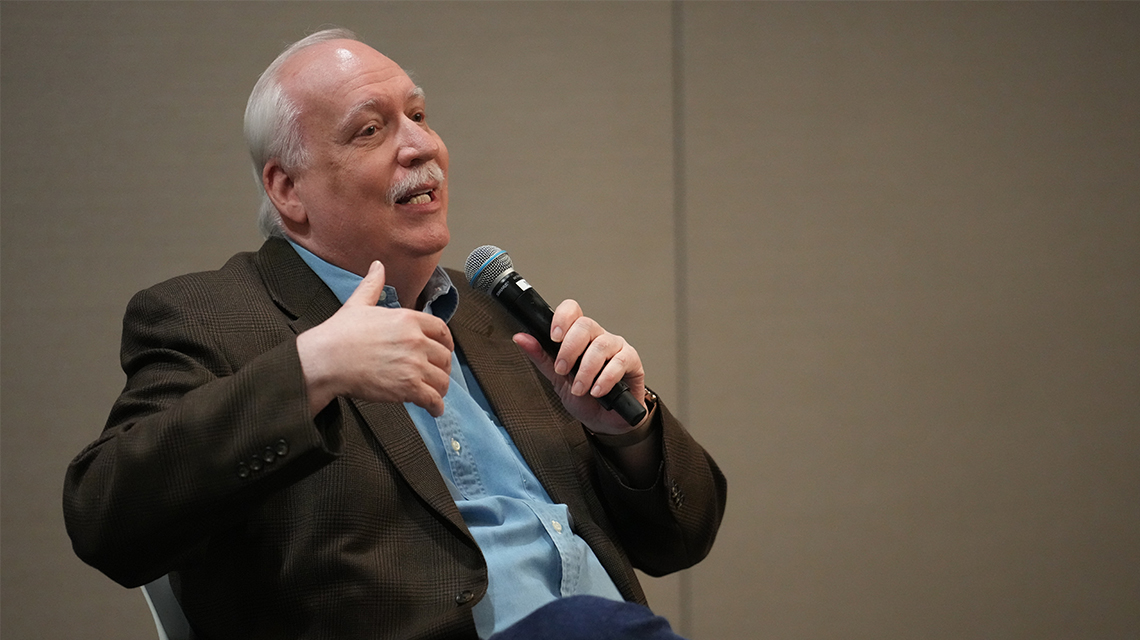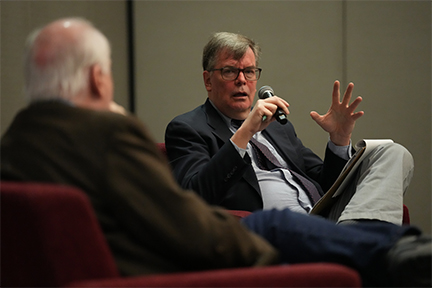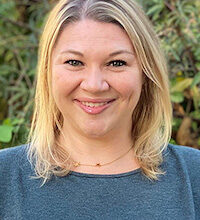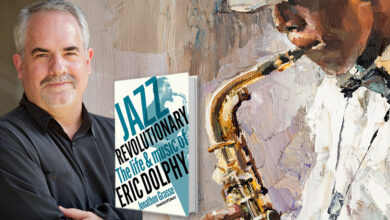
J. Michael Straczynski doesn’t much care for rules. As a student at San Diego State University, he risked expulsion by bluffing his way into two writing courses taught by celebrated writer and educator Norman Corwin. Straczynski didn’t get expelled, and Corwin became a lifelong friend and cherished mentor. But he understood the risks, and therein lies an important lesson.
“In order to be any kind of creative person, you have to be willing to push outward and engage with the world in ways that sometimes break the system,” Straczynski told students and faculty during his 2024 Patricia Eliet Memorial Lecture at the LSU ballroom on April 11. “When you do that, strange and wonderful things happen.”
In a career that spans more than five decades, Straczynski has earned wide acclaim for his work in television, film, graphic novels, fiction, memoir, and even video games. He has contributed scripts for such Hollywood luminaries as Clint Eastwood, the Wachowski siblings, and Kenneth Branagh. His script for Eastwood’s 2008 film The Changeling was nominated for a BAFTA (the British equivalent of the Academy Awards).
As creator and showrunner on the 1990s sci-fi series Babylon 5, Straczynski won two Hugo awards—the highest honor for writers of science fiction. His graphic novels for some of the largest comic book franchises—The Amazing Spider-Man and Superman—have sold more than 13 million individual issues and been New York Times bestsellers.

Randy Cauthen, professor of English and director of composition at CSUDH, said he chose Straczynski for this year’s lecture because of his forthrightness and dedication to the craft of writing.
“He’s allergic to bullshit, and I think that comes through in his writing and when he spoke to us,” said Cauthen, who served as moderator for the Eliet lecture and the Q&A that followed. “He was really clear to me that more than anything else, he wanted to talk about things that would be helpful to young writers.”
Cauthen added that he had personal reasons as well for inviting Straczynski. “More selfishly, I wanted to see him because he’s been a model for me in terms of how hard he works and how many different challenges he takes on for himself, and how much joy he takes in doing the actual writing.”
The best writing advice he ever got, Straczynski said, came from Rod Serling, the screenwriter and television producer who created the enormously influential series The Twilight Zone in the 1950s.
A 17-year-old Straczyinski attended a career day on the campus of Southwestern College in Chula Vista. He and other creatives had their work out on display. Toward the end of the event, Serling approached his table and selected one of his stories. He finished it and grabbed a second one.
“He returns the stories to the table and takes a long look at me,” Straczynski recalled. “‘Two pieces of advice,’ the man tells me. ‘One, cut every third adjective.’ I’m still working on that, even today. ‘Two, never let them stop you from telling the story you want to tell.’”
One of the greatest obstacles to writing, Straczynski warned, is something he called the tyranny of reasonable voices.
“The people around you can want to protect you and shelter you, but ultimately they will keep you from getting where you want to go,” he said. “The reason I’m going into this at some length is because one thing that writing classes don’t teach is the importance of courage.”
What writers engage in, Straczynski said, is a “holy chore,” which in his view doesn’t receive enough emphasis in discussions about the craft. “Writers and other artists change the world. If there’s something you walk out of here with today, it’s that you are engaged in a profession in which courage is required.”“All I have is this knowledge, and I’m ridiculously proud and happy that Randy invited me here today to talk to you because we need new voices. We need new points of view. We need people who are going to stand up.”








